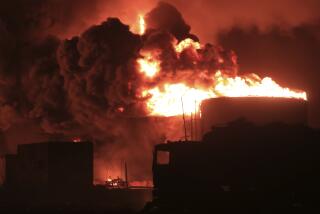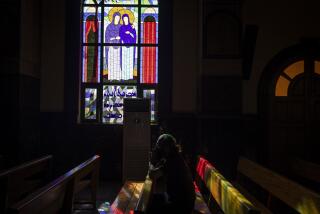Feud within key Yemen tribe could tear nation apart
Reporting from Sana, Yemen, and Baghdad — The unrest shaking Yemen began months ago as part of the idealistic movement for democracy and political reform sweeping the Middle East and North Africa. It is now a battle of money, power and egos within a single powerful clan that threatens to tear the country apart.
The elite Republican Guard and special forces commanded by the son of President Ali Abdullah Saleh have been fighting for more a week with those who support the head of the president’s own tribe, Sheik Sadiq Ahmar, and his businessman brother Hamid. The escalation in fighting has left up to 160 people dead, including 20 on Thursday as thousands of residents fled Sana, the capital, for tribal villages.
Sana has become a battleground where government buildings are seized and torched.
If poverty-stricken Yemen collapses, the fuse will have been lighted by this internal tribal war pitting the president against his senior clansman, analysts say. Al Qaeda sympathizers waiting in the shadows, or separatist movements in the north and south might benefit, but it will have been the feud between the Ahmars and Saleh that sent Yemen into a downward spiral.
“The conflict between these groups is threatening to drag the country into civil war,” said April Alley, an analyst on Yemen with the International Crisis Group think tank.
Until about two weeks ago, the effort to oust Saleh after nearly 33 years in power focused on a plan by international mediators to persuade him to step aside, and the lopsided street battle between Saleh’s military and demonstrators.
Then, a fragile peace between the president and Sadiq Ahmar, the head of the Saleh’s own Hashid tribal confederation, broke down. The conflict changed.
“Saleh and the Ahmars are fighting to see who gets Yemen next, like our country is a prize to be won. This fighting will continue and the Yemeni people will suffer greatly,” said Sana resident Abdul Rahman Sunahi, speaking by telephone from his home in the Hasaba district while explosions and gunfire could be heard in the background.
“Saleh’s tanks have been firing on buildings and homes, but the tribesmen are heavily armed. They know what they’re doing. I expect this to drag on for quite some time,” Sunahi said.
The Ahmar family has towered over Yemen’s politics for decades. The brothers’ father, Sheik Abdullah Ahmar, paved the way for Saleh, a young military officer with only an elementary school education, to become president. The older Ahmar remained loyal to his protege, but when Ahmar died in 2007, the familial ties crumbled.
Sons Sadiq and Hamid Ahmar came to view Saleh’s immediate family as rivals. Saleh has decided to take the brothers on directly.
“It’s about power, money and prestige. People’s egos are involved, and it’s a very messy situation,” said Gregory Johnsen, a former Fulbright fellow in Yemen and a doctoral candidate in Near Eastern studies at Princeton University. Both Saleh and the Ahmars have been looking to lure other tribes around the country to their side, he said.
“The longer this goes on, the more groups will be sucked in, and it will be a great deal harder to reverse,” Johnsen said.
The feelings are raw among supporters of both sides.
One Ahmar tribal supporter who had fought Saleh’s troops in Sana, seethed at the shelling last week of the home of the Ahmar brothers’ father.
“If you want to bomb Hamid’s house, fine, bomb Hamid’s house. But don’t defile the memory of Sheik Abdullah, God rest his soul, by attacking his home,” said tribesman Mohammed Qumayni.
Saleh’s supporters painted the Ahmars in similarly crude terms.
A manager at Yemen’s state-run Saba news agency, who was nearly killed on Thursday when Ahmar tribesmen opened fire on his car, called the Ahmars the worst that Yemeni society has to offer — “ignorant, uneducated hicks.”
“How can you deal with such ignorant people? You have to fight them,” he said.
The rift has been looming for several years.
Saleh has been trying to arrange a hand-over of power to his son, Ahmed, the head of the Republican Guard and special forces. The Ahmar brothers and their eight male siblings, some of whom once worked in happier times on Saleh’s security detail, bristled at the president’s efforts to hoard power.
“The sons of Sheik Abdullah have a rich family tradition of leadership and influence, and they feel that they have a right to play a prominent role in Yemen’s future,” said Alley, the Yemen analyst. “They feel that the sons and nephews of Saleh are robbing them of this inheritance.”
Since Saleh’s troops shelled a mediation effort in Sadiq’s home May 24, the normally mild-mannered sheik has stepped up his rhetoric against Saleh. In the minds of his supporters, it was a declaration of war.
“Ali Abdullah Saleh is a liar, liar, liar,” Sadiq said in an interview with Al Jazeera satellite television a week ago. “We are firm. He will leave this country barefoot.... I say to all tribes: Do not be late.” A day later, he announced a cease-fire, but it fell apart almost as quickly as it started.
Sadiq, who is in his mid-50s, has a wrinkled face and sunken eyes. He carries a traditional ceremonial dagger strapped to his bulging stomach.
In contrast, his brother Hamid is a flashy and charismatic businessman who is fluent in English and owns Yemen’s largest cellphone provider, a string of fast-food restaurants and an Islamic bank. He has held a seat in parliament for 17 years with the Islah party, which includes the Muslim Brotherhood. Some observers say the party has ties to Al Qaeda.
Hamid backed Saleh’s opponent in 2006 elections, but denies he now is riding the coattails of Yemen’s protest movement. Some observers believe he funded the pro-democracy demonstrations; a 2009 U.S. Embassy cable posted by WikiLeaks quotes him as saying he was planning demonstrations to bring Saleh down.
In an interview recently at his palatial residence, surrounded by hundreds of armed men, he denied having aspirations to replace Saleh. “It is not appropriate for a businessman such as myself to accept such a lofty political office,” he said.
Speaking in a booming voice, he smiled and laughed often — but remained calm, even when making an apparent threat in comparing Saleh with Egypt’s deposed President Hosni Mubarak.
“If Saleh refuses to leave, well, we don’t have a Sharm el Sheik in Yemen,” he said, referring to the Red Sea resort where Mubarak took refuge.
Special correspondents Boone and Craig reported from Sana and Times staff writer Parker from Baghdad.
More to Read
Sign up for Essential California
The most important California stories and recommendations in your inbox every morning.
You may occasionally receive promotional content from the Los Angeles Times.










